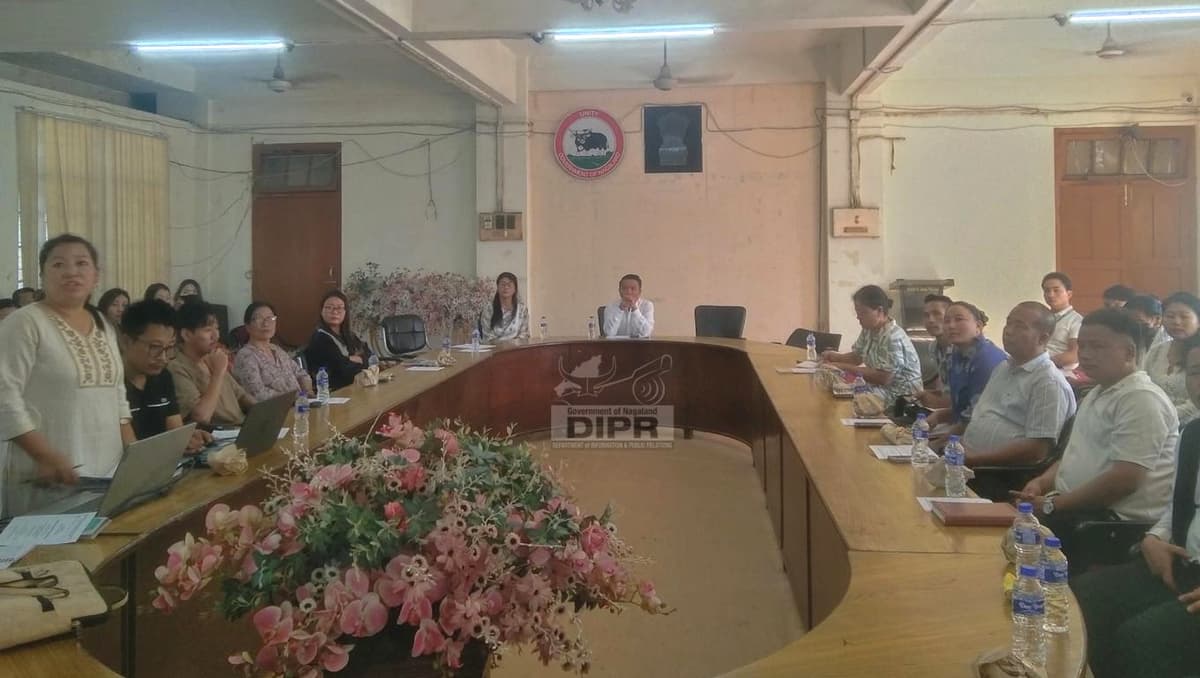FRIDAY, NOVEMBER 21, 2025
- Home
- DAPCC meeting in Dimapur focuses on HIV-TB coordination
DAPCC meeting in Dimapur focuses on HIV-TB coordination
Quarterly coordination meeting of DAPCC focuses on HIV-TB coordination, prevention efforts in Dimapur.
Share

DIMAPUR — The quarterly coordination meeting of the District AIDS Prevention and Control Committee (DAPCC), Community Resource Group (CRG) and HIV-TB Coordination, was held on Friday at the DC’s conference hall, Dimapur.
According to a DIPR report, the meeting was chaired by the Additional Deputy Commissioner, Zakabo Rotokha, who also encouraged all departments and organisations to strengthen collaborative efforts for better health outcomes.
District Programme Officer (DPO), DISHA, Mecievinuo presented the activities of DISHA and elaborated on the concept of the District Community Resource Group (DCRG).
She highlighted that DISHA (District Integrated Strategy for HIV) is a strategy developed by NACO (National AIDS Control Organisation) to strengthen the HIV/AIDS response at the district level in India.
Also read: PM-NAPS drive launched at ITI Kohima to boost skills training
It aims to augment the HIV response by using a cluster approach to monitoring the HIV epidemic in multiple districts. The DISHA units, formerly known as District AIDS Prevention and Control Unit (DAPCU), play a key role in monitoring and coordinating service delivery in the district, Mecievinuo said.
DISHA units are responsible for the management and coordination of HIV prevention and control programs within their respective districts.
In Nagaland, the DISHAs are under the aegis of the Nagaland State AIDS Control Society (NSACS). DISHA Cluster Dimapur looks after the Dimapur, Chumoukedima and Niuland districts.
The DPO also emphasised on the achievements in Dimapur district, Dimapur ART status, the need for community engagement and the role of grassroots stakeholders in responding to health challenges.
Presenting an overview of the National Tuberculosis Elimination Programme (NTEP), Dr. Benchilo Ngullie, outlined the current strategies, progress, and the need for sustained participation from all sectors to eliminate TB.
She highlighted on Nikshay 2.0, describing it as "a digital platform for community support for persons with TB. The initiative aims to streamline patient monitoring, support services, and timely intervention through technology.
The presentation also outlined the vision and goals of the national TB elimination strategy, reaffirming the commitment to achieve a TB-free India by the targeted year.
Key objectives discussed included ensuring quality diagnosis and treatment, improving notification rates, enhancing treatment success for drug-susceptible and drug-resistant cases, and reducing TB-related morbidity and mortality.
Ngullie mentioned the persistent issues and challenges, particularly the stigma surrounding TB in rural areas, emphasising the need for increased Advocacy, Communication and Social Mobilisation (ACSM) efforts, and encouraged greater involvement of TB Champions to help change public perception and reduce stigma.
She further shared Information on patient welfare schemes such as the Nikshay Poshan Yojana Nwas. Under the scheme, INR 1000 per month is provided to TB patients as nutritional support through Direct Benefit Transfer (DBT) until completion of treatment. Additionally, a tribal allowance of INR 750 is extended to eligible TB patients.
A short sharing session was held where Moa, president of the Dimapur Network of People Living with HIV/AIDS (DNP+), highlighted the experiences and challenges faced by people living with HIV.
A TB patient also shared personal experiences, reinforcing the importance of continued support systems.
The meeting concluded with an open discussion on gaps, challenges, and the way forward, focusing on enhancing coordination among agencies and improving service delivery for HIV and TB patients in the district.
Participants engaged actively throughout the programme, which aimed to strengthen community awareness, encourage timely diagnosis, and promote consistent treatment adherence for better public health outcomes.
Earlier, the programme began with a welcome address delivered by Dr. Benchilo Ngullie.

